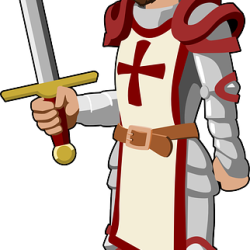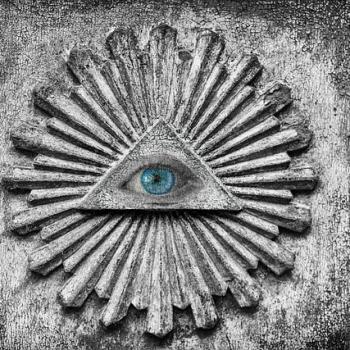If we didn’t say it ourselves when we were kids, we probably heard other kids say it: “My Dad can beat up your Dad.” We all wanted to think our Dad was the strongest, the best, the one with no fear and the one everyone else better fear. Why? Because we wanted to be protected. We wanted to know there was someone who would defend us and make sure no one would hurt us.
But there was something else going on too with such assertions. We liked to think we were linked to any supposed superiority by birth. Obviously, if my Dad can beat up all the other Dads, if I’m his son/daughter, that must say something about me too, right? We hoped by association alone to garner some respect, some attention and deference. I’m reminded of stories where the local police happen to pull over the rich kid in town, or the kid whose father was a prominent figure in the community. Upon making contact with the driver, the officer was asked, “Don’t you know who my father is?” Which is to also assert: “Guess who that makes me.”
There are a lot of identity issues tangled up in all this. Is it really about the Dad, or is it more about us? I think this sort of adolescent need for protection when we are children, which is understandable, can grow into something quite different as we get older. I think it eventually, if never grown out of, can still hang around but perhaps move from a biological father, to a…heavenly Father.
I believe this is actually a thread that runs through much of the fundamentalist/evangelical world. An example is the very popular Christian contemporary song, written by Chris Tomlin called “Our God.” Here is the chorus:
Our God is greater, our God is stronger
God You are higher than any other
Our God is Healer, awesome in power
Our God, Our God
Our God is greater, our God is stronger
God You are higher than any other
Our God is Healer, awesome in power
Our God, Our God
Even when I was still in that world, even when the worship team I was a part of performed this song, even then, it sounded to me like: “My Dad can beat up your Dad,” and, “My Dad is better than your Dad.” And of course, there are other songs like this one.
Notice too the ownership sensibility: This is “our” God. We possess this God. I know many funda-gelicals would object to such an interpretation. They would claim, rather, that this simply shows a relationship, that we are God’s children, and we are giving praise to that God. They would say that, as “born-again believers” they have a relationship with this God (children) that others do not have. In this sense, they would argue, this is “our” God and not the “unbelievers” God or the God of the Muslim or Hindu.
Putting aside, what I think anyway, is the faulty theology inherent in such a formulation, I am struck more here with what I think is the same sensibility wrapped up in the adolescent notion of “My Dad can beat up your Dad.” Further, I am struck by what I think is really the subtly hidden, underlying assertion: I am higher than these “others” by association.
I know many will think this unfair or not a very charitable understanding. Perhaps it isn’t. Still, I am not that optimistic about our fallenness (false-ness?) I guess. I think we are too easily drawn to such sensibilities, where we build a false picture of what we are doing. We assure ourselves we only mean, theologically, that the Christian Trinitarian God, is the only God that exists. That it has nothing to do with us. “Well, how dare you sir, whatever do you mean,” we reply in our defense.
What I mean is that this business of God being “ours” and being higher, better, stronger, more powerful, than any “other” meaning, “your” God, is more about us than God. It is about us wanting to be higher, better, and stronger than the “other.” By association, it is us asking the police officer, “Do you know who my Dad is?” Which, again, is really asking: “Do you know who I am?” In this context “Dad” is a foil, a stand-in, for our greater point, which is: How dare you treat me like, well, just, anyone.
My fear is that, when the, as the Bible puts it, Day of the Lord comes, the judgement, it will be the Father of all, the God of all peoples, the one who is close to the broken-hearted, the poor, the outcast, the marginalized, the forgotten, who will be the one pulling over the car of our life.
And when we indignantly ask this God, “Do you know who my father is?” or “Do you know who I am?” this God may reply: “No, I do not. And, clearly, you do not know who I am either.”
Yes, I am well aware of the Biblical language of “our” God and “our” Father. What I suspect however is that too many fundamentalist/evangelicals understand it as possession and ownership, as control, and as a subliminal reason to stand above, rather than the “our” being understood paradoxically.
The “our” is only possible because we (all humanity/all things) are God’s, and not the other way around. We cannot know we are God’s just like we cannot know God, or, as Father Thomas Hopko put it:
You cannot know God…but you have to know Him to know that.
I would add we cannot know God is “ours” but we have to know Him to know that.
“I looked, and behold, a great multitude which no one could number, from every nation, from all tribes and peoples and languages, standing before the throne and before the Lamb clothed in white robes with palm branches in their hands, and crying out with a loud voice, ‘Salvation belongs to our God who sits on the throne and to the Lamb!’” ~Rev. 7
The “our” God here is not the God we possess or own but the God who possesses and owns all things, including us. And lest we allow modernity to sully our ideas of possession and ownership, what I mean by “possess” and “own” is that God loves us in complete freedom—a freedom that runs both ways.
In that freedom, we proclaim the God of all things and people, whether recognized or not. And this God is not the God who beat up all the rest, but, rather, was beaten, whipped, spit upon, and hung naked upon a tree. In return, this God offered forgiveness and peace.
We don’t want to be associated with that God however. No, bring us the God who will defeat all our enemies. Well, it’s the same God—this is “our” God. And this God will defeat our enemies as soon as we realize the enemy…is…us. Once we are defeated, death and hell have no place and we get to Revelation 7.















